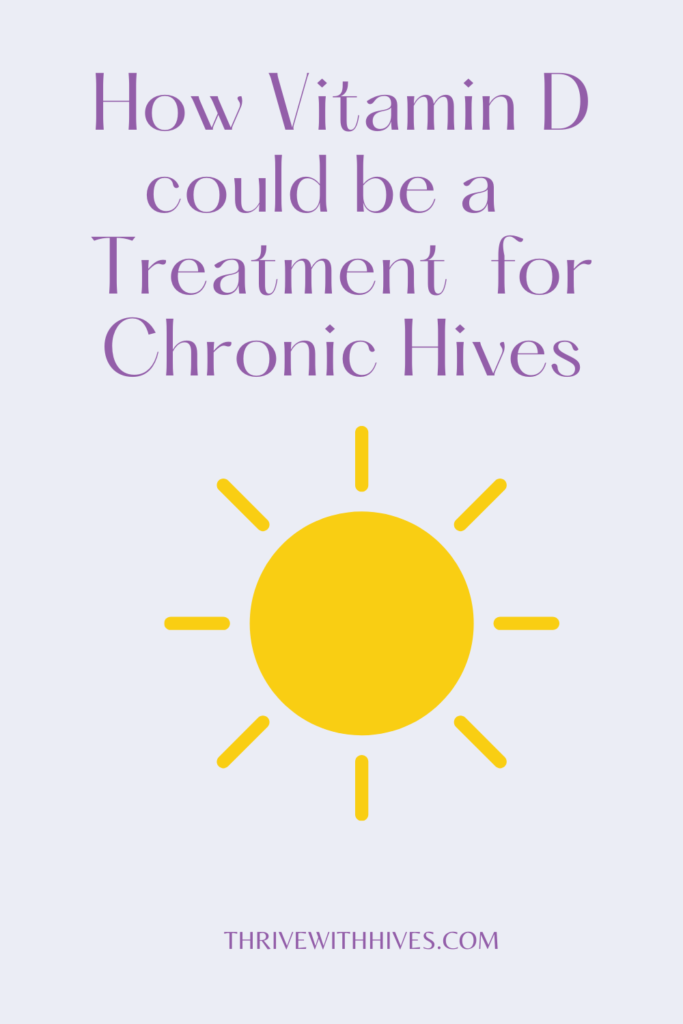Vitamin D for Chronic Hives. Can this Supplement Ease the Agony of Urticaria?
I am not a physician and nothing on this blog should be taken as medical advice. This is a general overview from my own research. As always you should check with your physician before making any changes to your treatment plan.

The agony of chronic hives is real. Especially when you are still in the phase where your symptoms aren’t yet under control. You feel desperate and would do just about anything to get rid of your hives. What if I told you that it may be as simple as adding a supplement to your daily routine? Vitamin D for chronic hives has been shown to be effective in reducing symptoms in some patients.
In this article we will learn about the importance of adequate vitamin D for chronic hives.
Vitamin D plays a vital role in many important functions. There are many reasons to take vitamin D, even you don’t have hives or your hives are well managed.
It is estimated that a billion people are vitamin D deficient. When researching I came across this interesting research article: Vitamin D Deficiency- An Ignored Epidemic.
Vitamin D is known as the sunshine vitamin because there aren’t many sources of Vitamin D occurring naturally in foods. Even with fortified foods, it’s difficult to get enough with diet alone. Our vitamin D levels are rather dependent on sun exposure. This can be an issue for many people who live in areas where we don’t get a lot of sunshine for a period of time every year. Vitamin D deficiency is more prevalent in darker skin tones, who don’t absorb it as fast.
Vitamin D is similar to a hormone. Every cell in your body has a receptor for it. It assists the body in absorbing calcium and is commonly associated with bone health. Low vitamin D levels in children can cause rickets. Many CSU patients have been found to have low vitamin D levels. Vitamin D for chronic hives is getting a lot of attention lately.
This post may contain affiliate links. I may get a small commission on products purchased. I appreciate your support in using my links and would never recommend a product that I would not use personally.
Some symptoms of vitamin D deficiency include :
- Fatigue
- Depression
- Muscle pain and weakness
- Slow healing
- Hair loss
- Headaches
- Allergies
- Poor immune function
- Infertility
- Hormone disruption
Vitamin D deficiency puts you at higher risk for
- Neuro-degenerative diseases including Alzheimer’s disease
- Osteoporosis
- Diabetes
- High blood pressure
- Colon and breast cancer
- Autoimmune diseases
What makes you higher risk for low Vitamin D levels:
- Elderly
- Dark skin tone
- Obesity
- Always wearing sunscreen when outdoors
- Little exposure to sunshine
- Living far form the equator

What makes vitamin D for Chronic Hives so important?
Vitamin D plays a huge role in our immune system. CSU/CIU is a disorder of the immune system. It’s important that we do what we can to support a healthy immune system.
Some studies have shown a correlation between vitamin D deficiency and autoimmune diseases. We know now that Chronic Spontaneous Urticaria, formerly Chronic Idiopathic Urticaria, is theorized to be autoimmune in nature. Studies have also shown that CSU patients tend to have significant Vitamin D deficiency.
Many CSU patients experienced a significant improvement in their symptoms when taking high doses of Vitamin D supplements. You can read about the correlation of vitamin d and chronic hives and the outcomes of supplementation HERE.
What is optimal vitamin D for Chronic Hives?
What is considered a normal vitamin D level may not necessarily be “optimal”. It’s important to work with your physician to determine how much to supplement with. The standard recommendation is 600iu per day but if you are deficient this number may be much higher. In the studies referenced above, the doses were significantly higher. It’s important to work with a physician to find the best dose for you.
Gut Health Vitamin D Connection
It’s interesting to note that a lot of people with gut health issues such as imbalance of the microbiome, also have skin manifestations. It seems according to new research there may also be a correlation with Vitamin D levels. Read about the gut health and microbiome correlation here.
How to get more Vitamin D
Vitamin D is called “The sunshine vitamin” for a good reason. Spend 15-20 minutes in sunshine with 40% skin exposure with no sunscreen daily if you are able. You can read more about safely getting vitamin D from the sun HERE.
Dietary sources of vitamin D are egg yolk, fatty fish, fortified dairy products and beef liver.
Supplementing with Vitamin D if your levels are low is important. Check with doctor for dosing. I like this one because it contains K2 as well which aids in absorption. It is free from additives and tasteless.
Eating some healthy fat like avocado along with Vitamin D supplement helps your body to increase absorption. This supplement has olive oil to aid in this.
If you would rather take a pill, these are the ones I used to take before switching to the drops. Of course, you can shop around and see if there is one that works better for you, or ask your physician for a recommendation.
Magnesium may help with absorption as well. This is the one I take but as always, check with your physician.
Conclusion
Is taking Vitamin D for Chronic Hives right for you? Ask your doctor to test your levels. Vitamin D levels should be at least 40 but higher levels may be optimal. Here is an interesting interview with Dr Grundy about Vitamin D and autoimmune diseases. Here is what Dr Mark Hyman has to say about optimum Vitamin D levels.
What it really comes down to is what is best for you. Every person is unique and has unique needs. What works for some may not work for others. However, you can see that vitamin plays an important part in your overall health. If you find that supplementing helps your hives, that’s fantastic. If it doesn’t help, at least you know that you are still benefiting from bringing your levels up to optimal.
If you are interested in the functional medicine approach you can find a practitioner here. Or ask your community for recommendations.
Try to get some sunshine today 🙂

For email updates sign up below for my free guide on 30 ways to thrive with hives.
One Comment